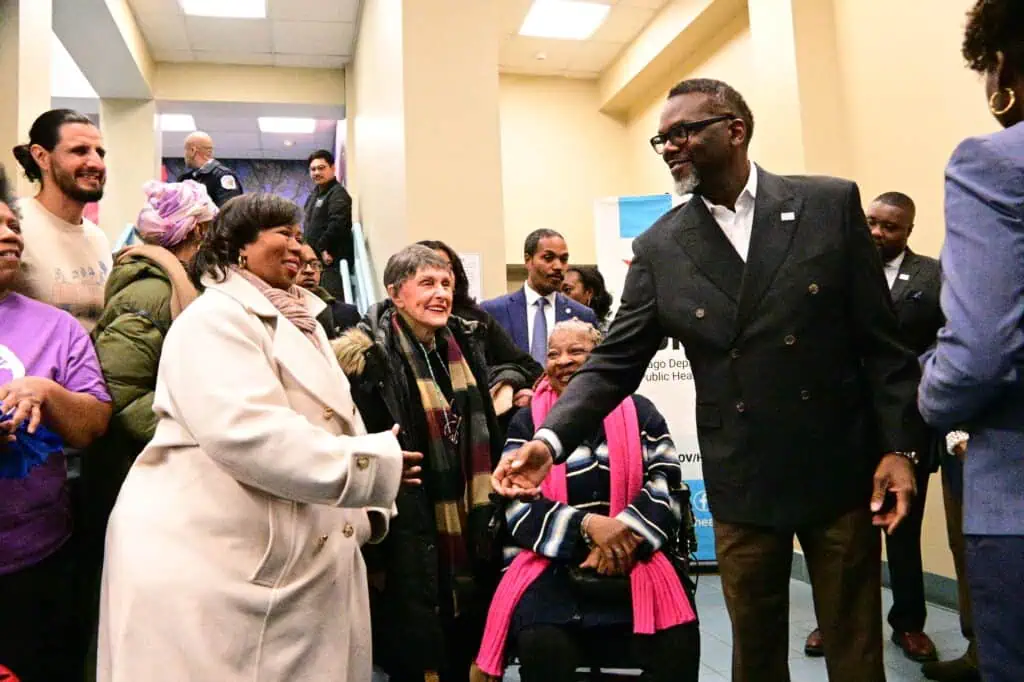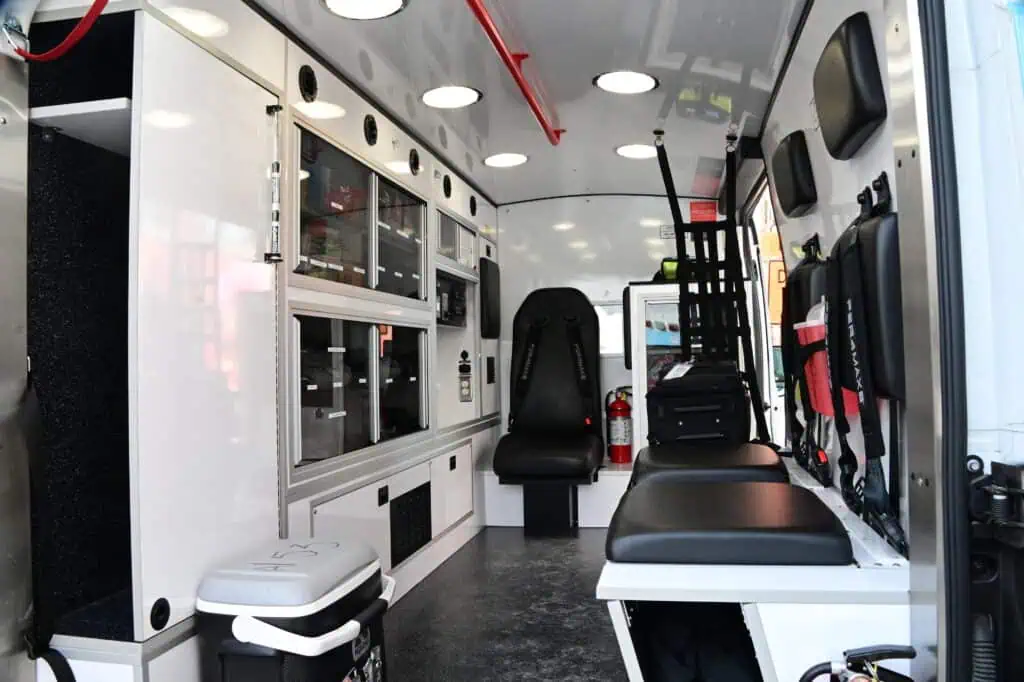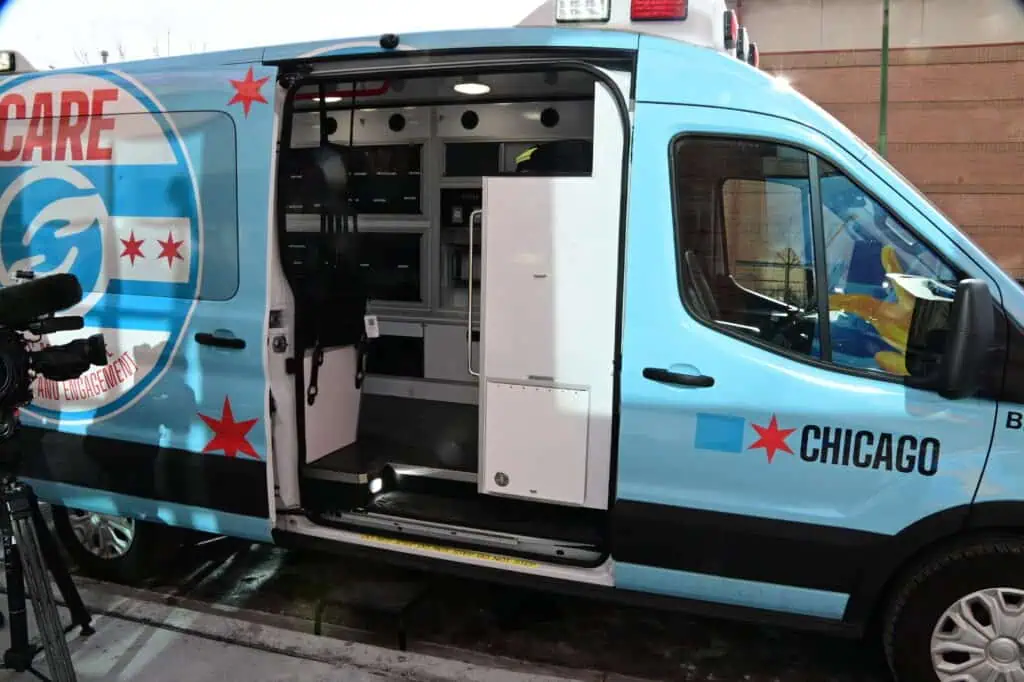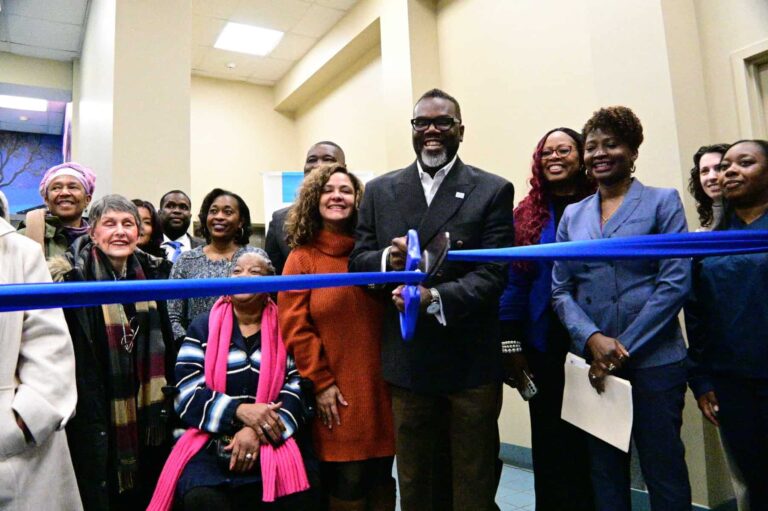Mayor Brandon Johnson cuts the ribbon to reopen the Roseland Mental Health Clinic.
Roseland Health Center has been renamed
Mayor Brandon Johnson marked a historic moment in Chicago's ongoing efforts to improve mental health services by reopening the former Roseland Mental Health Clinic, now renamed Roseland Health Center. Located at 200 E. 115th Street, this facility is designed to provide a wide range of free mental health and sexual services to Chicago residents, regardless of insurance or immigration status. The event, attended by city leaders, community members and department heads, reflects a renewed commitment to accessible and equitable health care.
Mayor Johnson described the reopening as the fulfillment of a key promise, and credited the collaboration of city partners, including AFSCME, the Illinois Nurses Association (INA), and the Truck Drivers Association, as well as the input of 400 community members who contributed feedback about the past year. “This is a promise we made and it was kept,” Johnson said. “Together, we build safer, stronger communities through a whole-of-government approach.”
Roseland Health Hub offers a variety of mental health services that address emotional, traumatic and behavioral challenges, including individual and family therapy. In addition, the facility provides sexual health services, such as testing and treatment for sexually transmitted infections, smallpox vaccinations, and pre-exposure prophylaxis (PrEP) to prevent HIV infection. Residents as young as six years old can access these services without worrying about their ability to pay. Psychiatric medication management is also available through walk-in at any Chicago Department of Public Health (CDPH) mental health center, including Roseland.
Chicago Department of Public Health Commissioner Dr. Olosimbo “Simbo” Ige stressed the importance of making the facility a one-stop resource for the community. “We want this space to be a health hub where people can connect to the services they need, on-site or off-site,” Dr. Ige said. “Our aim is to provide comprehensive, community-centred care and address mental health, social services and wider health needs.”

The reopening also coincides with the expansion of the Crisis Assistance Response and Engagement (CARE) program, a citywide initiative to address behavioral health crises. Initially piloted with support from the Chicago Fire Department and Chicago Police Department, CARE has transitioned fully to CDPH, where doctors and emergency medical technicians (EMTs) now respond to 9-1-1 calls flagged for mental health concerns. CARE teams provide de-escalation, mental health evaluations, and referrals to community services. They also perform follow-ups one, seven and 30 days after the encounter to ensure continuity of care.
Mayor Johnson announced that CARE will expand to include two additional police districts – Precincts 4 and 12 – covering neighborhoods such as Avalon Park, South Chicago, Burnside and the Lower West Side. The new citywide Special Cases Team will work outside of the 9-1-1 system to treat specific mental health emergencies that are referred directly to CDPH. “Our investments in programs like CARE demonstrate our commitment to choosing treatment over trauma,” Johnson said. “We are rebuilding a health care system that serves all of our residents, regardless of the neighborhood they live in or their ability to pay.”
The Roseland Health Center represents a critical step in addressing long-standing inequities in Chicago's mental health infrastructure. Pointing to a 1989 report commissioned by the late Mayor Harold Washington, Johnson noted that Chicago's public mental health system has faced significant challenges over the decades. Under Washington's leadership, the city operated 19 public mental health centers, but subsequent administrations reduced access by closing the facilities. The Johnson administration aims to reverse this trend by expanding services and investing in underserved communities.
During the ribbon-cutting ceremony, Johnson was joined by key city officials, including CDPH Commissioner Dr. Ige, Fleet and Facilities Management Commissioner Julie Hernandez-Tomlin, Public Buildings Commission Executive Director Ray Gedoff, Deputy Mayor Lori Lipson, and Deputy Mayor. Jarren Gatewood. Community members, advocates and elected officials celebrated the reopening as an important milestone on the Far South Side.
The facility also treats substance use disorders by providing access to recovery support and addiction counseling. Dr. Ige highlighted innovative resources such as vending machines stocked with health products, condoms, blood pressure medications and other necessities to meet immediate needs. “We provide services to everyone, from children and postpartum mothers to individuals seeking help for addiction,” she said.


The Roseland Health Center is part of the People's Vision for Mental and Behavioral Health, a strategic plan developed by the city's Mental Health System Expansion Workgroup in May 2024. The plan emphasizes a “continuum of care” that integrates mobile crisis response, virtual counseling and brick-and-mortar services to create a comprehensive network for residents The needy.
“Today’s reopening marks a turning point in mental health care in Chicago,” Johnson said. “For too long, emergency rooms and jails have served as de facto treatment centers, failing patients and communities alike. We are taking decisive action to ensure every Chicagoan has access to critical care, regardless of their zip code.
The Roseland Health Center and CARE program reflect Johnson's broader vision for public health. As the city continues to expand services, Johnson emphasized his administration's commitment to providing equitable health care. “It's about delivering on the promise that every resident deserves high-quality, accessible behavioral health care,” he said. “Together, we will build a system that prioritizes treatment over trauma and creates healthier, safer communities.”
Residents seeking services at the Roseland Health Hub can schedule appointments or learn more by visiting the CDPH website or calling (312) 747-1020. The CARE program can be reached through 9-1-1 or direct referrals to CDPH.
